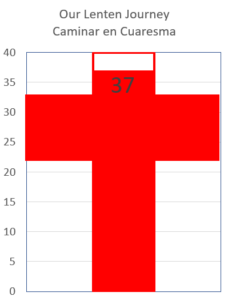

Our Lenten Journey / Caminar en Cuaresma
versión en español
Wednesday – April 5 – Day 37
Rejecting Empty Promises
One of the Twelve, who was called Judas Iscariot, went to the chief priests and said, “What are you willing to give me if I hand him over to you?” They paid him thirty pieces of silver, and from that time on he looked for an opportunity to hand him over. Matthew 26:14–16
The desire for money can become a powerful incentive to betray our Lord. In this Gospel passage, it seems clear that Judas’ betrayal was based on his desire for money. He most likely had some level of faith in our Lord, or he wouldn’t have become His disciple. But even if Judas did have some level of faith, his desire for money appeared to overshadow the faith he may have had.
One of the central lessons we can learn from Judas is that the desire for money is a powerful incentive for the decisions we make. So many of the great saints have taught us that the path to holiness consists, first, in a purification of all our disordered affections. And since one of the most powerful attachments that many struggle with is an attachment to money, this is an important desire to purify in all of our lives.
It’s true that material possessions are not evil when they are used for the fulfillment of God’s will. But the desire for more, for an excess, will always cloud our ability to see clearly the will of God and live for His glory alone.
Once Judas had betrayed our Lord and Jesus was arrested, recall that Judas “deeply regretted what he had done.” And during Jesus’ trial, Judas went back to the chief priests and said “I have sinned in betraying innocent blood” in an apparent attempt to stop the trial. But Jesus’ death was set in motion and could not be stopped. As a result, Judas returned the money and sadly went off to hang himself (See Matthew 27:3–5).
The desire Judas had for money clouded his thinking. And his sin did to him what sin always does. As soon as his sin of betrayal was done, Judas saw the consequences of that choice. And the consequences grieved him deeply. He learned that choosing sin ends with an empty promise. He realized that thirty pieces of silver was not worth the value of his soul. But of course, even then Judas could have repented and received the mercy of God. But he didn’t. He simply ended his life in ultimate despair.
Reflect, today, upon the witness of Judas. Use him as a source of meditation and self-examination this Holy Week. What is it in your life that you desire more than our Lord? What temptation clouds your thinking and leads you to choices that you know will end in emptiness? Strive to eradicate every disordered desire within you this day and choose wisely the will of God instead. Do not let yourself continue to believe the lies that keep you from making Jesus and His holy will the one and only focus of your life.
Let us pray:
My divine Lord, You and You alone must become the focus of my life. You and You alone are of the greatest value in life. Help me to shed all earthly desires in life so that I will not fall into the temptations that lead to empty promises and so that I will embrace the true and fulfilling promises that come from You.
Source: mycatholic.life
USCCB Daily Readings: bible.usccb.org/bible/readings/040523.cfm
Miércoles – 5 de abril – Día 37
Rechazar promesas vacías
Uno de los Doce, que se llamaba Judas Iscariote, fue a los principales sacerdotes y les dijo: “¿Qué me queréis dar si os lo entrego?” Le pagaron treinta piezas de plata, y desde entonces buscó ocasión para entregarlo. Mateo 26:14–16
El deseo de dinero puede convertirse en un poderoso incentivo para traicionar a nuestro Señor. En este pasaje del Evangelio, parece claro que la traición de Judas se basó en su deseo de dinero. Lo más probable es que tuviera cierto nivel de fe en nuestro Señor, o no se habría convertido en Su discípulo. Pero incluso si Judas tenía algún nivel de fe, su deseo de dinero parecía eclipsar la fe que pudo haber tenido.
Una de las lecciones centrales que podemos aprender de Judas es que el deseo de dinero es un poderoso incentivo para las decisiones que tomamos. Muchos de los grandes santos nos han enseñado que el camino a la santidad consiste, primero, en una purificación de todos nuestros afectos desordenados. Y dado que uno de los apegos más poderosos con los que muchos luchan es el apego al dinero, este es un deseo importante de purificar en todas nuestras vidas.
Es cierto que las posesiones materiales no son malas cuando se usan para el cumplimiento de la voluntad de Dios. Pero el deseo de más, de un exceso, siempre nublará nuestra capacidad de ver claramente la voluntad de Dios y vivir sólo para Su gloria.
Una vez que Judas hubo traicionado a nuestro Señor y Jesús fue arrestado, recuerda que Judas “se arrepintió profundamente de lo que había hecho”. Y durante el juicio de Jesús, Judas volvió a los principales sacerdotes y dijo: “He pecado al entregar sangre inocente” en un aparente intento de detener el juicio. Pero la muerte de Jesús se puso en marcha y no pudo ser detenida. Como resultado, Judas devolvió el dinero y tristemente fue a ahorcarse (ver Mateo 27:3–5).
El deseo de dinero que tenía Judas nubló su pensamiento. Y su pecado le hizo lo que el pecado siempre hace. Tan pronto como cometió su pecado de traición, Judas vio las consecuencias de esa elección. Y las consecuencias lo entristecieron profundamente. Aprendió que elegir el pecado termina con una promesa vacía. Se dio cuenta de que treinta piezas de plata no valían el valor de su alma. Pero, por supuesto, incluso entonces Judas podría haberse arrepentido y recibido la misericordia de Dios. Pero no lo hizo. Simplemente terminó con su vida en la máxima desesperación.
Reflexiona, hoy, sobre el testimonio de Judas. Úsalo como fuente de meditación y autoexamen en esta Semana Santa. ¿Qué hay en tu vida que deseas más que a nuestro Señor? ¿Qué tentación nubla tu pensamiento y te lleva a tomar decisiones que sabes que terminarán en el vacío? Esfuércense por erradicar cada deseo desordenado dentro de ustedes este día y elijan sabiamente la voluntad de Dios en su lugar. No te permitas continuar creyendo las mentiras que te impiden hacer de Jesús y Su santa voluntad el único enfoque de tu vida.
Oremos:
Mi divino Señor, Tú y sólo Tú debes convertirte en el centro de mi vida. Tú y sólo Tú tienes el mayor valor en la vida. Ayúdame a despojarme de todos los deseos terrenales de la vida para que no caiga en las tentaciones que llevan a las promesas vacías y para que abrace las promesas verdaderas y cumplidas que vienen de Ti.
Lecturas de Hoy: bible.usccb.org/es/bible/lecturas/040523.cfm